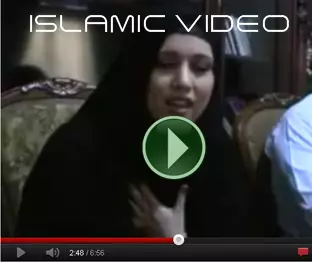There are signs that radical Islam has taken root in Russia’s prosperous republic of Tatarstan, east of Moscow, after attacks which left one Muslim leader dead and another severely injured last month.
Russian police have detained seven suspects, officials say. But local security sources told the BBC that more than 100 people had been questioned and according to some Tatar Muslim groups, the number of detainees is as high as 500.
A former pro-Kremlin Muslim leader, Valiulla Yakupov, was shot dead in the republican capital Kazan on 19 July. Later that day the Mufti of Tatarstan, Ildus Fayzov, was seriously wounded when his car was blown up in the city.
One of those arrested ran a body called Idel-Khadzh, organising Hajj pilgrimages to Mecca. He was allegedly in dispute with the mufti.
“The explosions and the gunfire that just rang out are only the beginning,” a well-known theologian, Mufti Farid Salman, told the BBC.
He thinks there are already more than 3,000 radical Islamists in Tatarstan, many of them opposed to peaceful dialogue.Radical Muslim internet forums have already called for the murder of people who frequently and openly criticise the spread of Wahhabism in Russia. Valiulla Yakupov’s name had appeared on one of their lists.
Wahhabism, a strictly conservative form of Islam that demands observance of Sharia law, has become popular among some militants in Russia’s volatile North Caucasus.
But Tatarstan, a mainly Muslim region on the Volga River, has long been seen as harmonious and stable. Even decades ago, in the Soviet Union, Tatarstan was seen as a model of peaceful co-existence for different nationalities and religions.
Paying ‘tribute’ to radicals
The mood has changed now, as extremist militants threaten to start a campaign of violence.
As we walk through a park an acquaintance greets Farid Salman with the words: “Hello, Farid! I’m glad to see you alive”.
Radical Muslims are getting some serious support from the criminal underworld, Russian security sources told the BBC.
Racketeers now encourage the collection of “tribute” at some of Kazan’s markets, exploiting the Muslim custom of paying Zakat (alms) – but donations are allegedly channelled towards militants waging violent jihad.
They also extort money from merchants who do not practise Islam, calling it an “infidel tax”.
‘Peace and quiet’
Radicalised Tatars have been found in the ranks of insurgents in Chechnya and even among the Taliban in Afghanistan.
Some experts say that followers of extremist branches of Islam in Tatarstan have put doctrinal disagreements aside and are combining forces in order to broaden their influence.
“The authorities preferred to maintain the pretence that peace and quiet reign in the region,” says Rais Suleimanov, head of the Volga regional branch of the Russian Institute for Strategy Research.
“They didn’t listen to us and they didn’t let us speak. As a result the situation got out of hand, and now that peace and quiet is no more than an illusion.”
After publishing research in 2010 on the development of Islamic fundamentalism in Tatarstan he was fired from his post at Kazan University’s Centre for Eurasian Research, and soon after that the centre itself was closed.
Mufti Farid Salman says the July attacks were “an overt, bold provocation”.
“It seems we’ve already reached a point of no return. More than one generation of convinced Wahhabis has already come of age in Tatarstan.”
After the assassination attempt on Tatarstan’s Mufti, the head of local interior ministry, Artyom Khokhorin, suddenly acknowledged that “an undeclared war has been going on in the region” for 13 years.
He said hundreds of extremists had been identified and monitored by the police. He added that in the past two years alone four armed rebel groups had been suppressed in Tatarstan.
Pretext for crackdown?
But now Russian security bodies are “using the situation to jail people they wanted to get or were ordered to,” according to a prominent Moscow lawyer, Musa Pliev. The head of a local nationalist organisation, the Azatlik Tatar Youth Union, agrees. Nail Nabiullin alleges that “this is all a provocation, led by Moscow”.
“We do not have Muslims who can commit such an evil crime,” he says.
Mr Nabiullin has already organised several rallies with the head of a Kazan mosque “against the suppression of Muslims”.
The organisers of one such rally on 5 August held it “according to Sharia rules”. All the participants, outsiders and even journalists were asked to stay “strictly in the male or female sections of the square”.
My colleagues and I tried to argue, but felt obliged to comply when four or five tall men with beards and calling themselves “Muslim police of the meeting” told us to follow the rules.
Arab influence dating back to the 1990s played a big part in the region’s radicalisation and there are now many young religious leaders in Tatarstan who were educated in Saudi Arabia and Egypt.
In 2011, Chechen insurgent leader Doku Umarov declared that Caucasian mujahideen should move to the Volga region to prepare local Muslims for jihad.
The armed struggle, he said, would result in a new state within a so-called Greater Caucasus Emirate.
On the day of the July attacks in Tatarstan, a video address by “the mujahideen of Tatarstan”, confirming Doku Umarov’s statement, appeared on the internet.
There are fears that if the authorities respond to the threat with tough action, there could be a backlash from Muslims in Tatarstan.
They are likely to find it harder to stem the spread of radical Islam now than they might have done just a few years ago.
SOURCE: BBC NEWS




















